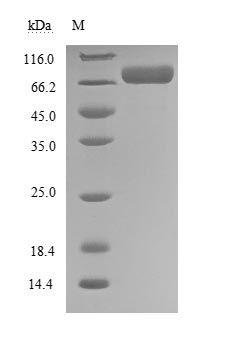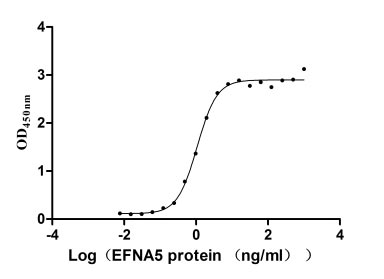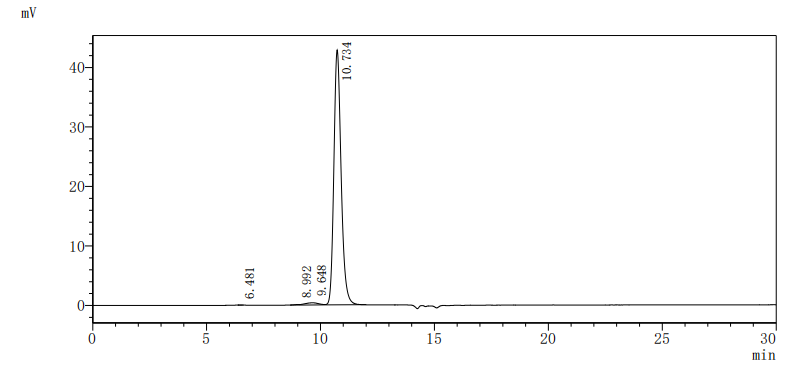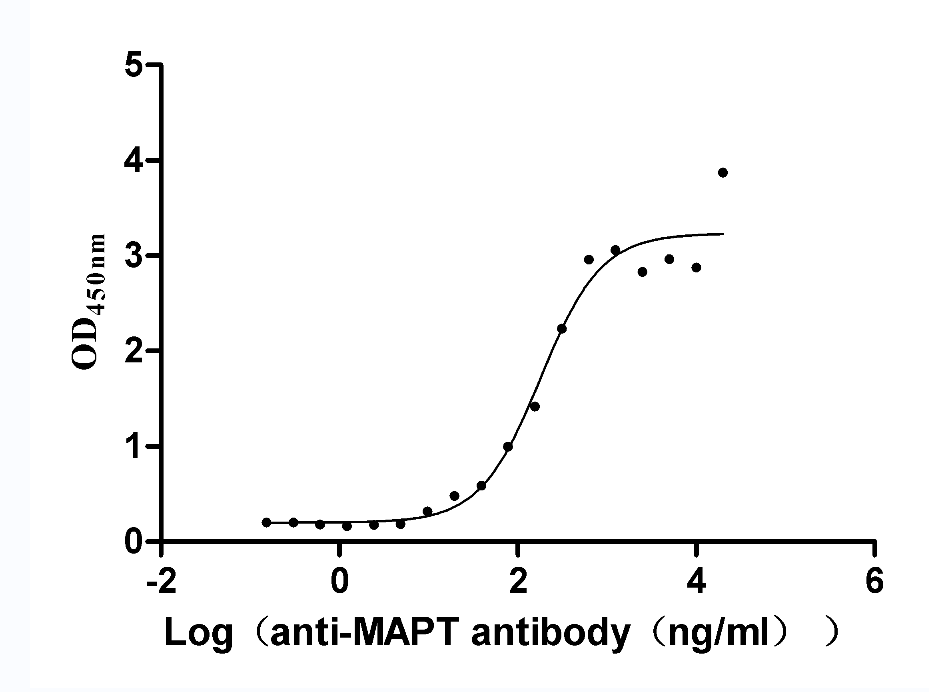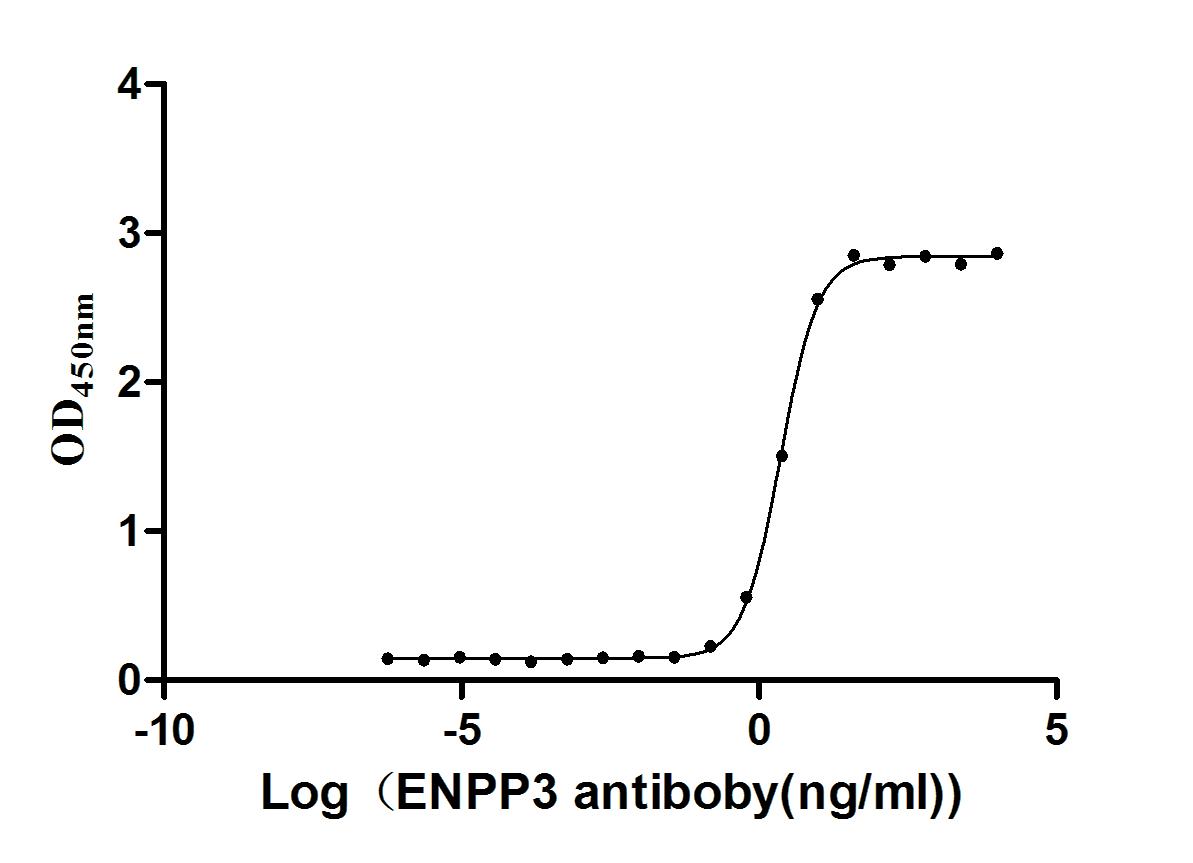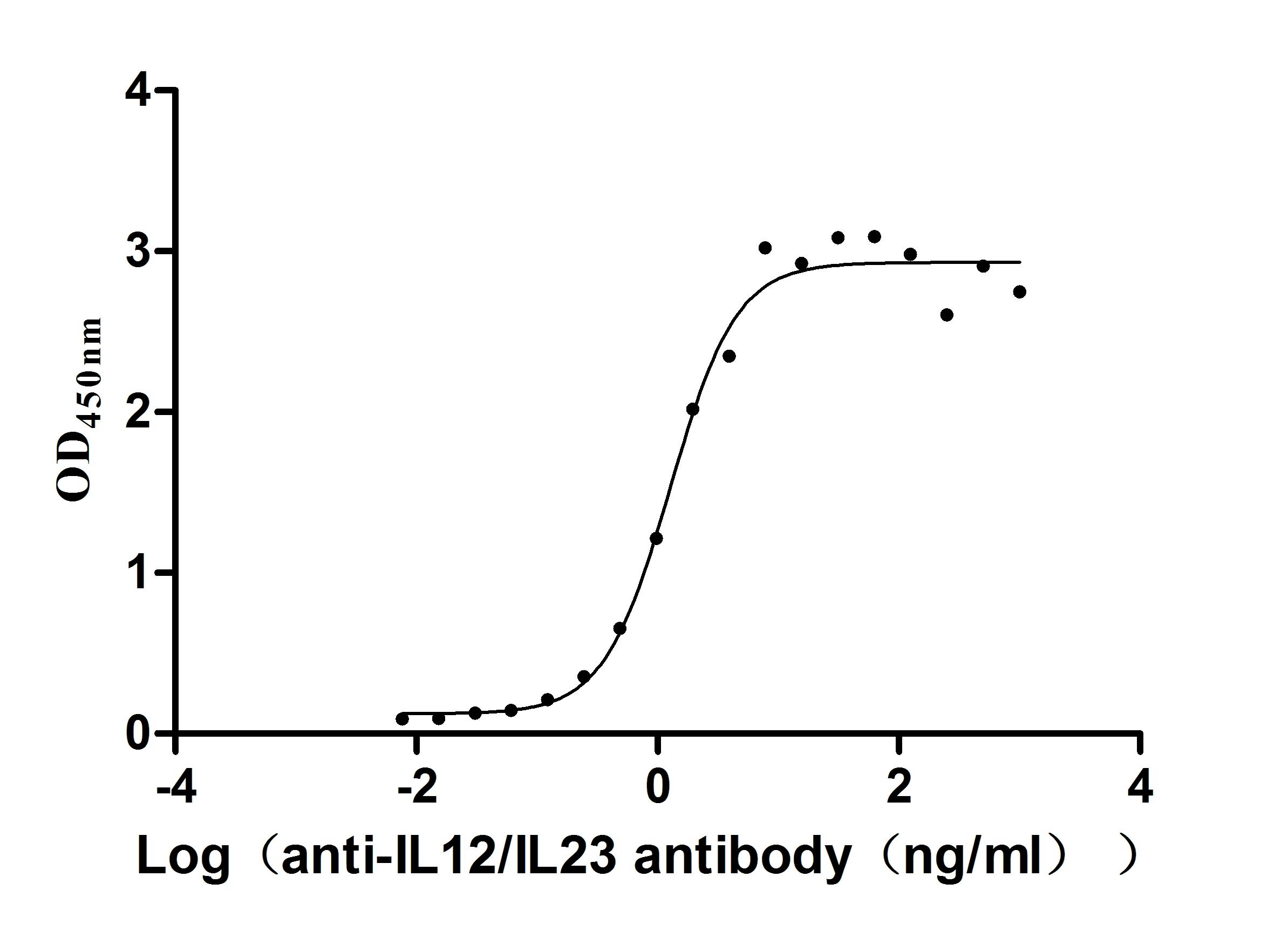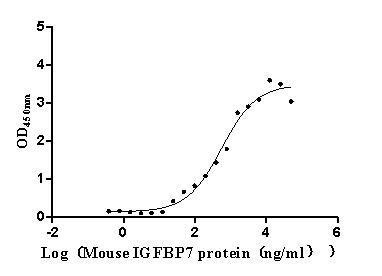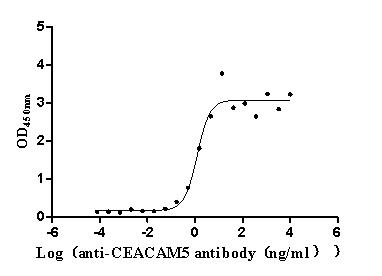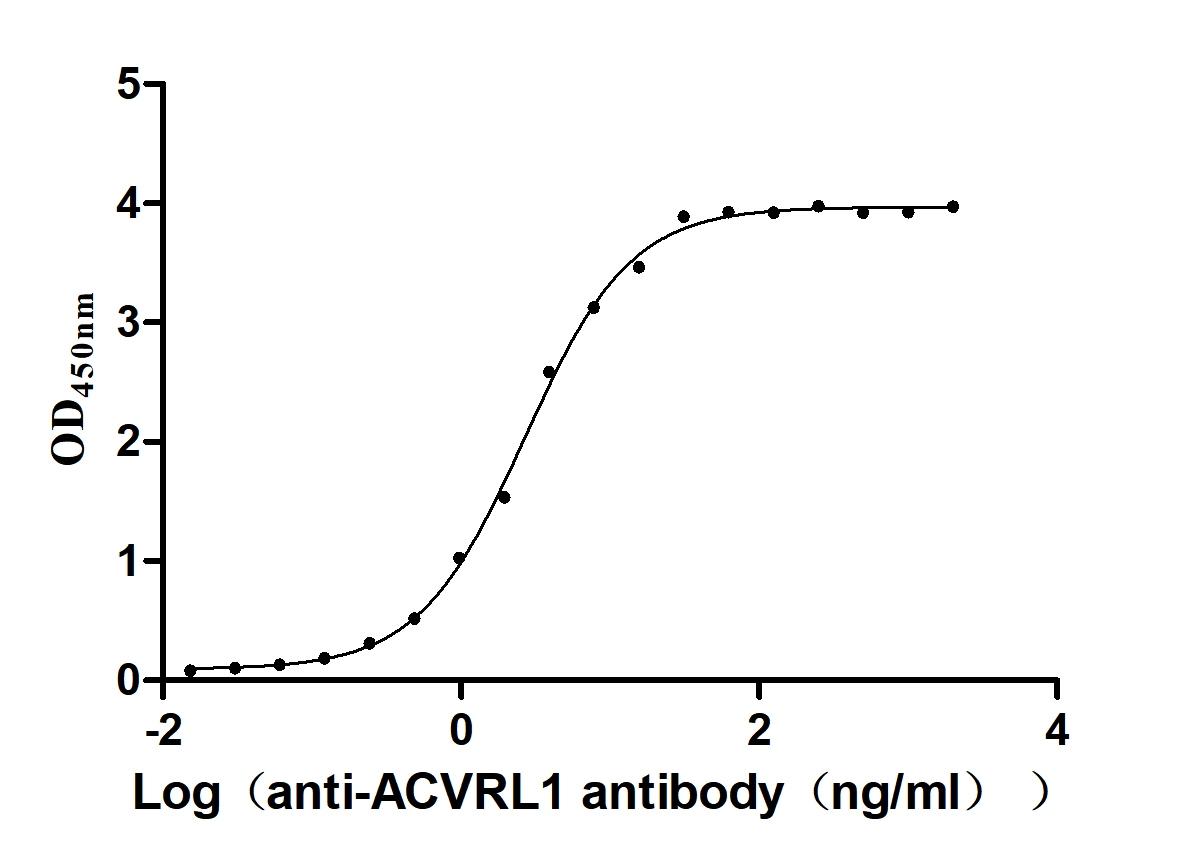Recombinant Human Ephrin type-A receptor 3 (EPHA3), partial (Active)
In Stock-
货号:CSB-MP007723HU
-
规格:¥1368
-
图片:
-
(Tris-Glycine gel) Discontinuous SDS-PAGE (reduced) with 5% enrichment gel and 15% separation gel.
-
Activity
Measured by its binding ability in a functional ELISA. Immobilized EPHA3 at 2 μg/ml can bind human EFNA5(CSB-MP007464HU), the EC50 of the protein is 0.9734-1.179 ng/ml. -
Activity
Human EPHA3 protein his tag (CSB-MP007723HU) captured on COOH chip can bind Human EFNA5 protein Fc tag (CSB-MP007464HU) with an affinity constant of 13.8 nM as detected by LSPR Assay. Biological Activity Assay -
The purity of Human EPHA3 was greater than 95% as determined by SEC-HPLC
-
-
其他:
产品详情
-
纯度:Greater than 95% as determined by SDS-PAGE.
Greater than 95% as determined by SEC-HPLC. -
内毒素:Less than 1.0 EU/ug as determined by LAL method.
-
生物活性:①Measured by its binding ability in a functional ELISA. Immobilized EPHA3 at 2 μg/ml can bind human EFNA5(CSB-MP007464HU), the EC50 of the protein is 0.9734-1.179 ng/ml. ②Human EPHA3 protein his tag (CSB-MP007723HU) captured on COOH chip can bind Human EFNA5 protein Fc tag (CSB-MP007464HU) with an affinity constant of 13.8 nM as detected by LSPR Assay.
-
基因名:
-
Uniprot No.:
-
别名:AW492086; Cek4; EC 2.7.10.1; EK4; End3; Eph receptor A3; EPH-like kinase 4; EPH-like tyrosine kinase 1; EPHA3; EPHA3_HUMAN; Ephrin receptor EphA3; Ephrin type-A receptor 3; ETK 1; ETK; ETK1; HEK 4; HEK; HEK4; Human embryo kinase 1; Human embryo kinase; Mek4; MGC109882; Receptor tyrosine kinase HEK; Testicular tissue protein Li 64; Tyro 4; Tyro4; TYRO4 protein tyrosine kinase; Tyrosine protein kinase receptor ETK 1; Tyrosine-protein kinase receptor ETK1; Tyrosine-protein kinase TYRO4
-
分子结构:
-
种属:Homo sapiens (Human)
-
蛋白长度:Partial
-
来源:Mammalian cell
-
分子量:61.0 kDa
-
表达区域:21-541aa
-
氨基酸序列ELIPQPSNEVNLLDSKTIQGELGWISYPSHGWEEISGVDEHYTPIRTYQVCNVMDHSQNNWLRTNWVPRNSAQKIYVELKFTLRDCNSIPLVLGTCKETFNLYYMESDDDHGVKFREHQFTKIDTIAADESFTQMDLGDRILKLNTEIREVGPVNKKGFYLAFQDVGACVALVSVRVYFKKCPFTVKNLAMFPDTVPMDSQSLVEVRGSCVNNSKEEDPPRMYCSTEGEWLVPIGKCSCNAGYEERGFMCQACRPGFYKALDGNMKCAKCPPHSSTQEDGSMNCRCENNYFRADKDPPSMACTRPPSSPRNVISNINETSVILDWSWPLDTGGRKDVTFNIICKKCGWNIKQCEPCSPNVRFLPRQFGLTNTTVTVTDLLAHTNYTFEIDAVNGVSELSSPPRQFAAVSITTNQAAPSPVLTIKKDRTSRNSISLSWQEPEHPNGIILDYEVKYYEKQEQETSYTILRARGTNVTISSLKPDTIYVFQIRARTAAGYGTNSRKFEFETSPDSFSISGESSQ
-
蛋白标签:C-terminal 6xHis-tagged
-
产品提供形式:Liquid or Lyophilized powder
Note: We will preferentially ship the format that we have in stock, however, if you have any special requirement for the format, please remark your requirement when placing the order, we will prepare according to your demand. -
缓冲液:Lyophilized from a 0.2 μm filtered 20 mM Tris-HCl, 0.5 M NaCl, 6% Trehalose, pH 8.0
-
储存条件:Store at -20°C/-80°C upon receipt, aliquoting is necessary for mutiple use. Avoid repeated freeze-thaw cycles.
-
保质期:The shelf life is related to many factors, storage state, buffer ingredients, storage temperature and the stability of the protein itself.
Generally, the shelf life of liquid form is 6 months at -20°C/-80°C. The shelf life of lyophilized form is 12 months at -20°C/-80°C. -
货期:Basically, we can dispatch the products out in 1-3 working days after receiving your orders. Delivery time may differ from different purchasing way or location, please kindly consult your local distributors for specific delivery time.Note: All of our proteins are default shipped with normal blue ice packs, if you request to ship with dry ice, please communicate with us in advance and extra fees will be charged.
-
注意事项:Repeated freezing and thawing is not recommended. Store working aliquots at 4°C for up to one week.
-
产品描述:
The Human Ephrin Type-A receptor 3 (EPHA3) is a membrane tyrosine kinase receptor that promiscuously binds to ephrin family ligands. EPHA3 participates in migration and cell adhesion processes, thus mediating in the mesenchymal transition and the focal adhesion assembly. So it’s a known oncogene for colorectal cancer. This recombinant protein is expressed in mammalian cells and fused with a 6xHis-tag on the C-terminus. The expressed region is the 21-541aa of the human EPHA3 protein, with a molecular weight of 61 kDa. The purity of the final product is higher than 95%, as determined by SDS-PAGE. The biophysical parameters of this recombinant protein were tested with ELISA and LSPR. In the functional ELISA, this recombinant protein has an EC50 of 0.9734-1.179 ng/ml for the binding with human EFNA5. LSPR determines the affinity constant for the binding with human EFNA5 is 13.8 nM. This protein product can be used in ELISA and Surface Plasmon Resonance to determine the presence and concentrations of their ligands in the sample and as a control for ligand binding assays. It also can be used as an immunogen to immunize the rabbit or other animals to get corresponding antibodies and is applied to immunological studies related to immune response pathways. The final product has low levels of endotoxin, with less than 1.0 EU/µg as determined by the LAL method.
-
Datasheet & COA:Please contact us to get it.
相关产品
靶点详情
-
功能:Receptor tyrosine kinase which binds promiscuously membrane-bound ephrin family ligands residing on adjacent cells, leading to contact-dependent bidirectional signaling into neighboring cells. The signaling pathway downstream of the receptor is referred to as forward signaling while the signaling pathway downstream of the ephrin ligand is referred to as reverse signaling. Highly promiscuous for ephrin-A ligands it binds preferentially EFNA5. Upon activation by EFNA5 regulates cell-cell adhesion, cytoskeletal organization and cell migration. Plays a role in cardiac cells migration and differentiation and regulates the formation of the atrioventricular canal and septum during development probably through activation by EFNA1. Involved in the retinotectal mapping of neurons. May also control the segregation but not the guidance of motor and sensory axons during neuromuscular circuit development.
-
基因功能参考文献:
- High EPHA3 expression is associated with tumor growth and angiogenesis in gastric cancer. PMID: 30066881
- To investigate the relationship between five EPHA3 single nucleotide polymorphisms (SNPs) and Nonsyndromic Cleft Lip With or Without Cleft Palate (NSCL/P), EPHA3 SNPs (rs7650466, rs1398197, rs17801309, rs1054750, and rs7632427) were genotyped. The rs7650466 T allele was associated with the incidence of NSCL/P as well as with protective and dominant effects in both conditions. PMID: 29932736
- Although EPHA3 was reported to be one of the most frequently mutated genes in colorectal tumors, our studies using inducible isogenic cell line systems, mouse models and large human tumor collections, did not reveal a major role of this EPH receptor on proliferation/motility/invasion of cancer cells, tumor initiation/progression/metastasis in mouse models or survival of colorectal cancer patients. PMID: 28169277
- The interaction of AR and SP1 contributes to regulate EPHA3 expression. PMID: 29917167
- Findings suggest that EPH receptor A3 (EphA3) plays an important role in the pathogenesis of multiple myeloma (MM). PMID: 28721629
- Study shows that EphA3 is highly overexpressed in multiple myeloma (MM) and provides evidence that EphA3 plays an important role in MM angiogenesis. PMID: 28415715
- Results indicate that EphA3 protein expression is reduced in clear-cell renal cell carcinoma, suggesting the possibility that this receptor functions as a tumor suppressor in this disease. PMID: 27591824
- EphA3 promotes malignant transformation of colorectal epithelial cells by upregulating oncogenic signaling pathways. PMID: 27721017
- Data indicate that EPHA3 is involved in regulating the multidrug resistance (MDR) of small cell lung cancer (SCLC) via PI3K/BMX/STAT3 signaling and may be a therapeutic target in SCLC. PMID: 27101199
- PTP-PEST regulates EphA3 activation both by affecting cytoskeletal remodelling and through its direct action as a PTP controlling EphA3 phosphorylation. PMID: 26644181
- This study showed that EPHA3 gene involved in neuronal growth and cerebellum development and associated with neurological and psychological disorders. PMID: 26381449
- A novel association between the EPHA3 deletion and prostate cancer risk was observed in Finnish individuals. PMID: 26552734
- EphA3 forms dimers in the absence of ligand binding. PMID: 26232493
- Data indicate that hypoxia increased EphA3 receptor (EphA3) mRNA expression in EphA3+ endometrial multipotent mesenchymal stromal cells (eMSCs). PMID: 25420155
- EphA3 was induced by PC-1 and contributed to the malignant progression of prostate cancer PMID: 25231727
- Based on the knowledge that EPHA4 has been previously shown to rescue SOD1 transgenic mice from ALS phenotype and prolongs survival, EPHA3 may be a promising candidate for therepuetic interventions PMID: 23991104
- EphA3 may represent a novel candidate marker for patient prognosis as well a molecular target for HCC therapy. PMID: 23970317
- EPHA3 mutations may promote tumorigenesis only when key senescence-inducing pathways have been inactivated. PMID: 23324396
- EphA3 may play important roles in the angiogenesis and prognosis of gastric carcinoma PMID: 22350700
- High EphA3 expression is associated with glioblastoma multiforme. PMID: 23410976
- Cancer-associated EPHA3 mutations attenuate the tumor-suppressive effects of normal EPHA3 in lung cancer. PMID: 22829656
- EphA3 has ephrin- and kinase-dependent tumor suppressing activities, which are disrupted by somatic cancer mutations PMID: 22242939
- expression of EphA3 and CD133 in carcinoma was significantly higher than that in normal mucosal tissue PMID: 21415057
- Experiments in EphA3/Isl2 knock-in mice test the interactions between effects of molecular labels and correlated activity during the development of neural connectivity. PMID: 21190559
- s found significant association between the copy number variations of EphA3 and hematologic malignancies. PMID: 21454190
- Data shew that the identification of three novel candidates as EPH receptor genes might indicate a link between perturbed compartmentalization of early neoplastic lesions and breast cancer risk and progression. PMID: 21124932
- Data provide further support that ALS2CL, EPHA3, and CMYA1 are bona-fide tumor-suppressor genes and contribute to the tumorigenesis of HNSCC. PMID: 20657180
- EphA3, was identified as a new CD28-responsive gene in Jurkat cells by using a human cytokine/receptor array. EphA3 expression in CD28-stimulated Jurkat cells was enhanced by IGF-1 or by overexpression of the IGF-1R. PMID: 14697337
- Results show EPHA3 gene was implicated in the pathogenesis of lung cancer and it may be useful targets for diagnostic and therapeutic intervention in selected patients. PMID: 16941478
- High-resolution structures of the EphA3 kinase with and without the juxtamembrane segment allowed mapping of the coupled pathway of residues that connect the juxtamembrane segment, the activation loop, and the catalytic residues of the kinase domain. PMID: 18547520
- EphA3 expression may define subsets of rhabdomyosarcoma tumours, and that EphA3 suppresses motility through regulation of Rho GTPases in rhabdomyosarcoma cells. PMID: 18814179
- D219V missense mutation in EPHA3 is associated with hepatocellular carcinoma. PMID: 19469653
- mechanism of substrate binding PMID: 19678838
显示更多
收起更多
-
相关疾病:Colorectal cancer (CRC)
-
亚细胞定位:[Isoform 1]: Cell membrane; Single-pass type I membrane protein.; [Isoform 2]: Secreted.
-
蛋白家族:Protein kinase superfamily, Tyr protein kinase family, Ephrin receptor subfamily
-
组织特异性:Widely expressed. Highest level in placenta.
-
数据库链接:
HGNC: 3387
OMIM: 114500
KEGG: hsa:2042
STRING: 9606.ENSP00000337451
UniGene: Hs.123642
Most popular with customers
-
Recombinant Human Intestinal-type alkaline phosphatase (ALPI) (Active)
Express system: Mammalian cell
Species: Homo sapiens (Human)
-
Recombinant Rat Microtubule-associated protein tau (Mapt) (Active)
Express system: Mammalian cell
Species: Rattus norvegicus (Rat)
-
Express system: Mammalian cell
Species: Homo sapiens (Human)
-
Recombinant Human Epithelial discoidin domain-containing receptor 1 (DDR1), partial (Active)
Express system: Mammalian cell
Species: Homo sapiens (Human)
-
Recombinant Human IL12B&IL12A Heterodimer Protein (Active)
Express system: Mammalian cell
Species: Homo sapiens (Human)
-
Recombinant Mouse Complement component C1q receptor (Cd93), partial (Active)
Express system: Mammalian cell
Species: Mus musculus (Mouse)
-
Express system: Mammalian cell
Species: Homo sapiens (Human)
-
Recombinant Human Serine/threonine-protein kinase receptor R3 (ACVRL1), partial (Active)
Express system: Baculovirus
Species: Homo sapiens (Human)

